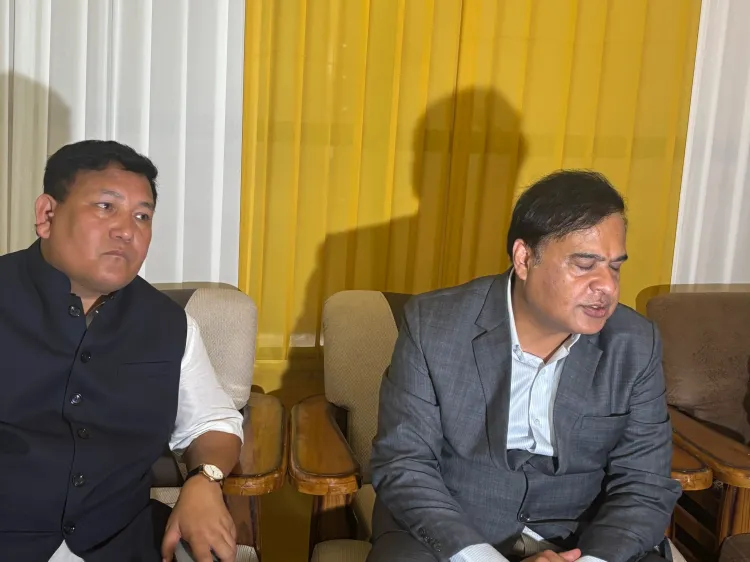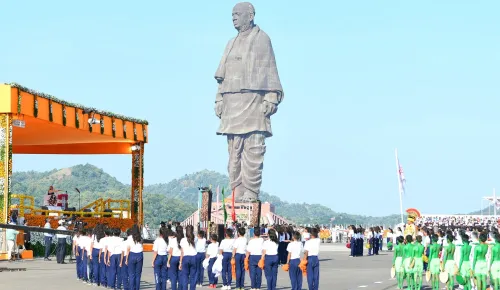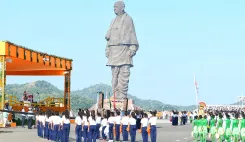Bodoland Chief Emphasizes Need for Power Decentralization Amidst Peace

Synopsis
Key Takeaways
- Pramod Boro emphasizes the unification of various revolutionary groups under the 2020 Bodo Peace Accord.
- The sustainability of peace in Bodoland relies on state and Union government actions.
- Decentralization of power is crucial to prevent the resurgence of armed agitation.
- Bodoland faces significant infrastructure and economic challenges.
- A vision document outlining demands will be released by March 2025.
Kokrajhar (Assam), Jan 28 (NationPress) The Chief Executive Member of the Bodoland Territorial Council (BTC), Pramod Boro, remarked on Tuesday that the 2020 Bodo Peace Accord with the Union and Assam governments was exceptional, as it brought together various revolutionary factions from different ideologies to sign the agreement.
Currently, Bodoland (Assam) enjoys peace, but the sustainability of this peace hinges on the actions of both the state and Union governments, he noted.
Boro stated to IANS, "We no longer endorse any form of protest. Weapons should only be wielded by defense personnel."
Marking the fifth anniversary of the Bodoland Peace Accord, the BTC Chief expressed, "All is well in Bodoland. The previous situation was dire, but now everything is fine. I am proud to be an Indian. Only military personnel should possess firearms; we do not wish to see local youths armed."
He further stated, "The political movement has been settled. The democratic and underground movements have been resolved. It was quite challenging to unite ideologically diverse revolutionary groups to sign the accord, with some advocating for a separate state while others sought autonomy. During the Assam agitation, all tribal groups participated, but after the 1980 Assam accord, tribals were marginalized, which triggered the Bodoland movement in 1987, resulting in significant violence. Other tribal factions also united in this struggle, leading to numerous fatalities during the agitation."
"One armed faction pushed for a separate state while another initiated a political movement. We endorsed the political movement; even armed groups halted their protests during the Kargil conflict, reinforcing their belief in one India," he stated.
"The completion of the accord took a decade. The underground NDP also engaged in discussions with the Centre and Assam government. All stakeholders convened to address the issues. The primary objective was to end armed conflicts in Bodoland, culminating in the 2020 peace accord. Now, all protestors have returned to the mainstream," Boro added.
He mentioned that by March 2025, a vision document is set to be released, detailing all demands to be presented to the Centre.
Nonetheless, Boro pointed out that the Bodoland region still lacks significant industries, and various infrastructure challenges need to be addressed.
The migration of youth to other parts of the country is also a pressing concern, he indicated.
"During the period of violence, all financial institutions relocated from Bodoland. Currently, funding is a significant issue due to the absence of banks in the region. Many businesses also departed. The new Bodoland council is actively working to reestablish these institutions in the area," he said.
The Bodoland Chief mentioned that they require approximately Rs 5,000 crore solely for road development, while the government allocates only Rs 800 crore annually.
He added, "Bodoland has also requested a Bodo regiment in the Indian Army, and our proposal is currently under review. We also seek to recruit Bodoland's youth into paramilitary forces, the Territorial Army, and the Agnipath scheme.
While some recruitments have occurred, the numbers remain limited," he noted.
The BTC Chief asserted, "The resurgence of armed agitation hinges on the devolution and decentralisation of power. It is essential to balance authority to prevent a return to unrest. If the Centre and state approach these matters correctly, stability can be maintained."
Boro commented, "The intellectual community offers many suggestions during unrest, yet few return once peace is restored."
Regarding the current accord, he stated that its provisions represent an ongoing process, and if all matters are settled, with or without the accord, we will be content either way.
The current leadership adopts a comprehensive approach, and all issues will be resolved over time, he concluded.
On the call for full statehood, Boro remarked, "We endorsed the accord for the community, although aspirations for a separate state may persist. Whether this is justified requires careful consideration. We should avoid unjustified agitations."
"Since leadership has acknowledged our aspirations, we signed the accord. I can only express my opinions; ultimately, the people must determine their future. The accord was signed to end violence," he stated.









